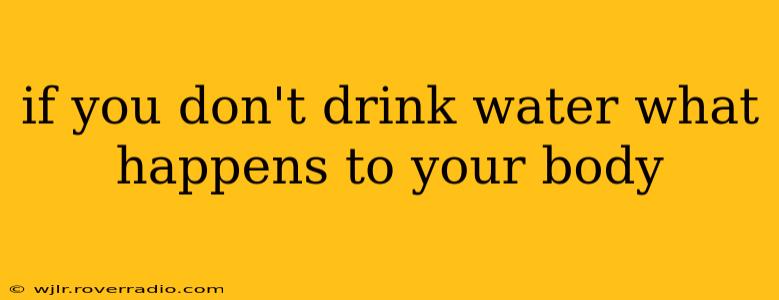Water is essential for life. It's not just a refreshing beverage; it's a vital component in countless bodily functions. So, what happens if you don't drink enough water? The consequences can range from mild discomfort to serious health problems. Let's explore the effects of dehydration on your body.
What are the early signs of dehydration?
One of the first signs you'll likely notice is feeling thirsty. This is your body's way of signaling that it needs more fluids. Beyond thirst, you might experience:
- Dry mouth and throat: This is a common and often early indicator.
- Fatigue: Dehydration can sap your energy levels, leaving you feeling tired and sluggish.
- Headache: Dehydration is a common trigger for headaches, sometimes quite severe.
- Dizziness or lightheadedness: Reduced blood volume due to dehydration can lead to these symptoms.
- Dark-colored urine: The color of your urine is a good indicator of hydration. Dark yellow or amber urine suggests dehydration. Pale yellow is a good sign of proper hydration.
What happens if dehydration continues?
If you ignore the early warning signs and continue to be dehydrated, the effects become more severe. You might experience:
- Muscle cramps: Dehydration can disrupt electrolyte balance, leading to painful muscle spasms.
- Constipation: Water is crucial for proper bowel function. Dehydration can lead to harder stools and difficulty passing them.
- Increased heart rate: Your heart has to work harder to pump blood when you're dehydrated.
- Fever: Dehydration can make it harder for your body to regulate its temperature, potentially leading to a fever.
- Severe fatigue and weakness: Prolonged dehydration significantly impacts energy production and overall physical function.
- Cognitive impairment: Dehydration can affect brain function, leading to difficulty concentrating and impaired cognitive abilities.
Can dehydration be fatal?
Yes, severe dehydration can be life-threatening. This is particularly true for infants, young children, and the elderly, who are more vulnerable to the effects of dehydration. Severe dehydration can lead to:
- Seizures: Extreme dehydration can disrupt the delicate balance of electrolytes in the brain, potentially triggering seizures.
- Heatstroke: Dehydration significantly increases the risk of heatstroke, a life-threatening condition characterized by dangerously high body temperature.
- Organ damage: Prolonged dehydration can damage vital organs, including the kidneys.
- Death: In extreme cases, severe dehydration can be fatal.
How much water should I drink daily?
The recommended daily water intake varies depending on factors like age, activity level, climate, and overall health. General guidelines suggest aiming for around 8 glasses (64 ounces) of water per day. However, it's best to listen to your body and drink when you're thirsty. You can also increase your water intake through fruits and vegetables with high water content like watermelon and cucumber.
What are the long-term effects of chronic dehydration?
Chronic dehydration, meaning a prolonged state of insufficient water intake, can have significant long-term health consequences, increasing the risk of:
- Kidney stones: Dehydration can contribute to the formation of kidney stones.
- Constipation: As mentioned earlier, consistent dehydration negatively impacts bowel regularity.
- High blood pressure: Dehydration can temporarily increase blood pressure. While the link to long-term high blood pressure isn't fully understood, maintaining proper hydration is still important for cardiovascular health.
- Fatigue and decreased performance: Consistent low hydration levels negatively impact overall energy levels and physical performance.
How can I prevent dehydration?
The best way to prevent dehydration is to drink plenty of fluids throughout the day. Carry a water bottle and sip on it regularly. Eat plenty of fruits and vegetables with high water content. Pay attention to your body's signals and drink when you feel thirsty. In hot weather or during strenuous physical activity, increase your fluid intake to compensate for sweat loss.
This information is for general knowledge and does not constitute medical advice. If you have concerns about your hydration status or are experiencing symptoms of dehydration, consult a healthcare professional. They can provide personalized recommendations and address any underlying health issues.
